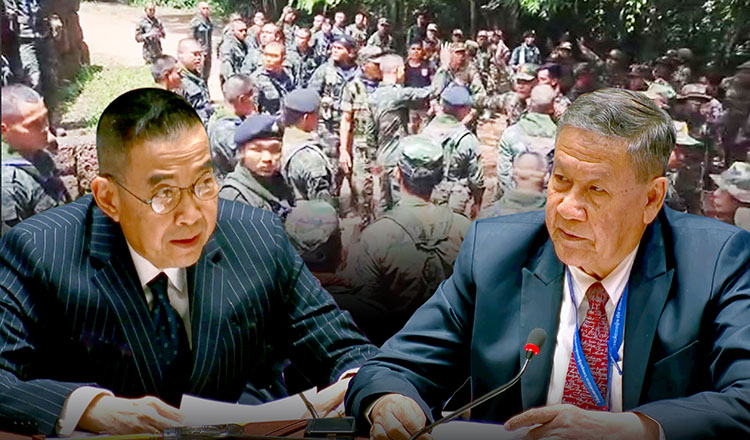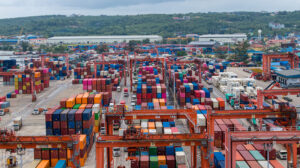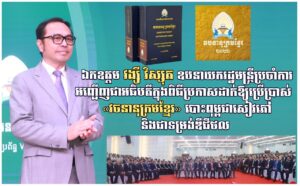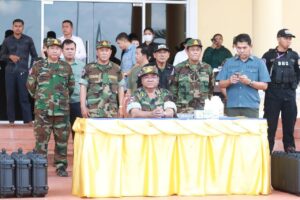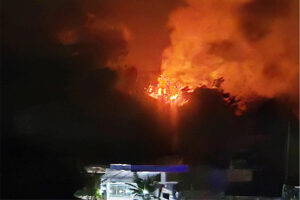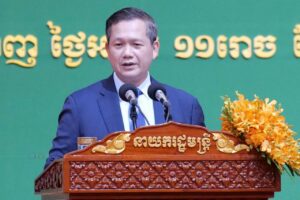Border tensions spike after new landmine blast injures Thai soldier
Khmer Times | Synopsis: Thai army closes key border checkpoints and restricts access to disputed heritage sites after soldier loses leg in explosion near Ta Moan Thom Temple.
Tensions have escalated along the Thai-Cambodian border after a Thai soldier was seriously injured in a landmine explosion in a disputed area near the Ta Moan Thom Temple. In response, Lieutenant General Boonsin Padklang, Commander of Thailand’s 2nd Army Area, has ordered a series of intensified countermeasures, including the closure of key border checkpoints and historical temple sites.
According to Thai media, the blast occurred yesterday, when Sergeant Phichitchai Boonkorat, a new recruit from a patrol unit of the 14th Infantry Regiment, stepped on a landmine in the Huai Bon area in Chong An Ma, Nam Yuen District, in Ubon Ratchathani province. The blast resulted in the loss of his right leg, prompting an immediate reaction from the Thai army.
In a swift response, the 2nd Army Area ordered the closure of four major border checkpoints—Chong Chom, Chong Sai Taku, Chong An Ma, and Chong Sa-ngam—effectively halting cross-border movement in the area. In addition, access to the historic Ta Moan Thom and Ta Krabei Temples has been restricted until further notice.
At the same time, Thailand’s National Police Chief, Pol Gen Kitrat Panphet, announced the deployment of riot control units to the Thai-Cambodian border, particularly near the disputed Ta Muen Thom Temple in Surin Province. Although no immediate unrest has been reported, Kitrat called the move a precautionary measure requested by the military in anticipation of potential gatherings or flare-ups.
“There are no abnormal incidents at the moment,” Kitrat said at a press briefing on Tuesday. “But this is a proactive step to prepare for any situation that may arise in a historically sensitive area.”
According to Kitrat, the primary responsibility for security along the border rests with the Suranaree Force and the 2nd Army Region. However, the police have been called upon to support crowd control efforts, particularly in cases where civilian interactions at the temples might lead to confrontation.
“The Ta Moan Thom area has seen minor skirmishes in the past,” Kitrat noted. “We are taking measures to prevent any repeat of those events. Our goal is to ensure peace and order and to avoid unnecessary escalation.”
When asked why the Border Patrol Police (BPP), traditionally responsible for securing border zones, were not being deployed, Kitrat explained that BPP units are currently engaged in other operations. Instead, Surin Provincial Police—more familiar with the local terrain and communities—have been tasked with the mission, in coordination with Provincial Police Region 3 Commander, Pol Lt Gen Wattana Yijeen.
While military and police officials emphasised that no active operations are underway, they confirmed that riot units are on standby in case of a planned gathering in the border area between July 26 and 27.
“If the gathering is peaceful, we will let it proceed,” Kitrat stated. “But if tensions rise, our officers are prepared to intervene swiftly and professionally.”
Kitrat concluded by affirming the police’s loyalty to national sovereignty: “We are ready to protect our country with our lives. We will follow the lead of the Royal Thai Army and the 2nd Army Region. With reports of a possible gathering, it is only prudent to be prepared.”
Officials from both Thailand and Cambodia have yet to issue a statement on the landmine incident.
Just two days ago, Cambodian and Thai representatives at the United Nations had reaffirmed their nations’ commitment to resolving disputes through international law and peaceful multilateralism, after Thailand made a thinly veiled threat to unilaterally block access to the disputed border sites in blatant disregard for the “red line” set by Cambodia, undermining the very principles it claims to uphold.
Cambodia’s Permanent Representative to the United Nations, Keo Chhea, had participated in a debate under the agenda item “Maintenance of International Peace and Security” hosted by the UN Security Council and chaired by Pakistan.
Ambassador Chhea said Cambodia’s foreign policy firmly supports peaceful dispute resolution and multilateralism.
“As a small state, Cambodia has consistently relied on rule-based international orders to safeguard its sovereignties and territorial integrities and to ensure an equal voice among nations,” he said.
“We reaffirm our strong commitment to the UN Charters, particularly Chapter 6, which outlines a comprehensive tool for the peaceful settlement of disputes through negotiation, mediation, arbitration, and judicial settlement.”
Chhea noted that lessons from Cambodia’s past civil war taught that peace must be cultivated through inclusive dialogues, compromise, and national ownership. The painful experience, he added, reinforces the Kingdom’s enduring commitment to the value of peaceful resolutions, both within its neighbourhood, across the region, and beyond.
“When nations abandon these avenues, they not only breach the international law but also erode mutual trust and weaken the credibility of our shared institutions,” he said. “Upholding these principles reflects genuine political will and commitment to fair, lasting, and peaceful solutions that promote regional and global stability.”
Speaking on behalf of Thailand at the same UN debate, Thai Foreign Affairs Minister Maris Sangiampongsa said his country is deeply concerned by the growing reliance on power projections and confrontational approaches, which risk further escalating the situation. The issue, he added, highlighted an urgent need to redouble countries collective efforts and embrace new approaches towards the peaceful settlement of disputes.
“At this difficult time, our commitment to the principle enshrined in the Charters of the United Nations must be strengthened,” he said.
“Thailand emphasises that disputes must be solved through dialogue, mutual respect, and cooperation while firmly upholding the principle of non-interference and respect for the sovereignties and territorial integrities of states.”
Maris noted that Article 33 of the UN Charter offers various peaceful resolution methods, stressing that there is no one-size-fits-all solution and that each dispute should be resolved in a context-specific manner, respecting the sovereignty of the parties involved.
“Thailand recognises the role of the United Nations in promoting peace and non-violence,” he said. “In this spirit, multilateralism creates an enabling environment where solutions can be pursued effectively, reinforcing the legitimacy and trust that underpin peaceful settlements.”
Both Cambodian and Thai representatives did not refer to the escalating border tensions between the two neighbours.
However, while the Cambodian representative concluded his speech by expressing the Kingdom’s support for international judicial mechanisms in dispute settlement, the Thai foreign minister insisted on relying on “existing mechanisms and developing innovative approaches to early warning, confidence-building measures, and dialogue” while taking into consideration the specific context of each situation.
On Tuesday, citing rising tensions on the Thai-Cambodian border, Lt Gen Boonsin Padklang, Commander of Thailand’s 2nd Army Region, issued a warning that he may order his soldiers to close access to the Ta Moan Thom temple, an 11th-century Khmer temple and one of the disputed sites in the border area.
Boonsin, who claimed that the temple is located within Thai territory, told Thai local media that the plan is to prevent “potential issues” caused by Cambodian tourists.
“I have discussed the matter with the Commander of the 42nd Cambodian Infantry Division. I have made it clear that Cambodia must control its people,” he said.

